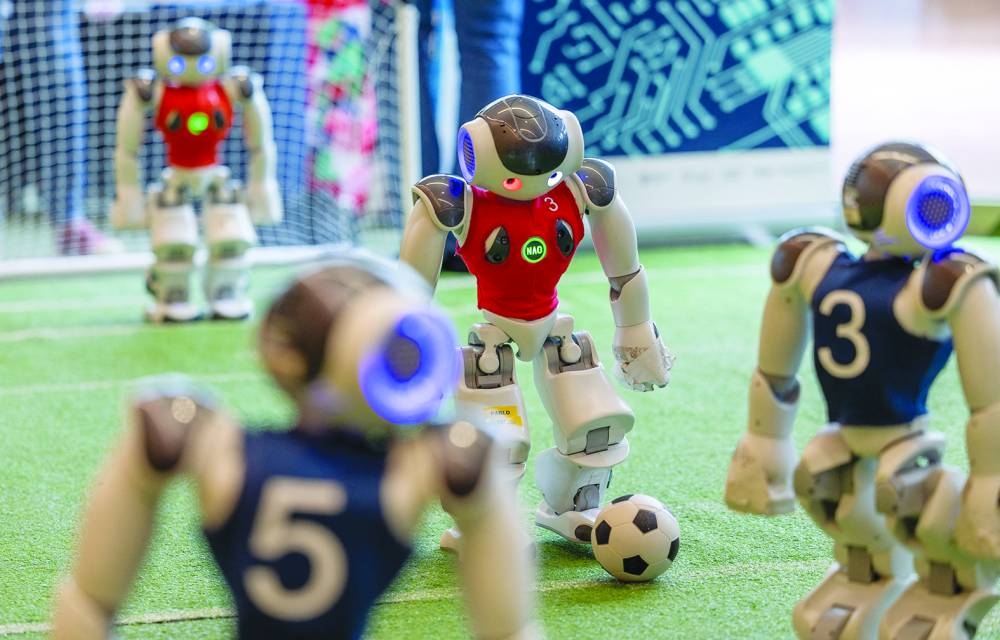Teams of robots jostled on a miniature artificial soccer pitch as androids answered trivia questions and took jabs at human ignorance yesterday at an artificial intelligence (AI) summit on the technology’s wide-ranging uses.
Organisers said the AI for Good Global Summit in Geneva showed the ways the technology could improve and even transform lives.
“Sometimes we think about AI as just something big,” said Tomas Lamanauskas, deputy secretary-general of the UN’s International Telecommunication Union (ITU) which staged the event. “At the same time AI can be embedded in so many more things in everyday life ... whether it’s for flood forecasting, disaster management and early-warning systems, in agriculture, in health. It’s across the board.”
Displays showed off prosthetic limbs that could learn from a user’s behaviour and adapt to muscle activity, devices to help visually impaired people avoid obstacles in the street and bionic cats and dogs built to act as companions.
The football-playing robots were the work of a group of students from the university of ETH Zurich.
The team kicked, passed and kept track of the ball based on input from sensors.
“The project allows our undergraduate and graduate students to collect experience on a full robotic platform,” Jan-Nico Zaech, the project’s scientific supervisor, said. “It’s a platform to test algorithms that can run in the real world afterwards.”
Meanwhile, a top UN official warned that humanity is in a race against time to harness the colossal emerging power of AI for the good of all, while averting dire risks.
“We’ve let the genie out of the bottle,” said ITU Secretary-General Doreen Bogdan-Martin.
“We are in a race against time,” she told the opening of a two-day AI for Good Global Summit. “Recent developments in AI have been nothing short of extraordinary.”
The thousands gathered at the conference heard how advances in generative AI are already speeding up efforts to solve some of the world’s most pressing problems, such as climate change, hunger and social care.
“I believe we have a once-in-a-generation opportunity to guide AI to benefit all the world’s people,” Bogdan-Martin told AFP ahead of the summit.
However, she lamented that one-third of humanity still remains completely offline, and is “excluded from the AI revolution without a voice”.
“This digital and technological divide is no longer acceptable.”
Bogdan-Martin highlighted that AI holds “immense potential for both good and bad”, stressing that it was vital to “make AI systems safe”.
She said that was especially important given that “2024 is the biggest election year in history”, with votes in dozens of countries, including in the United States.
She flagged the “rise of sophisticated deep fakes disinformation campaigns” and warned that the “misuse of AI threaten democracy (and) also endangers young people’s mental health and compromises cybersecurity”.
Other experts at the conference agreed.
“We have to understand what we’re steering towards,” said Tristan Harris, a technology ethicist who co-founded the Centre for Humane Technology.
He pointed to lessons from social media – initially touted as a way to connect people and give everyone a voice, but which also brought addiction, viral misinformation, online harassment and ballooning mental health issues.
Harris warned the incentive driving the companies rolling out the technology risked dramatically swelling such negative impacts.
“The number one thing that is driving Open AI or Google behaviour is the race to actually achieve market dominance,” he said.
In such a world, he said, “governance that moves at the speed of technology” is vital.
Azeem Azhar, founder of Exponential View, also stressed the need for a more robust institutional response.
“This is a technology that tends to winner-take all, and the rewards are so high that there is quite the unseemly landgrab going on at the moment,” he told the gathering. – Reuters/AFP

Nao robots of the Nomadz team, programmed by the ETHZ and Insait Bulgaria, play a game of soccer during the AI for Good Global summit on artificial intelligence, organised by the International Telecommunication Union (ITU), in Geneva, Switzerland, May 30, 2024. REUTERS/Denis Balibouse
